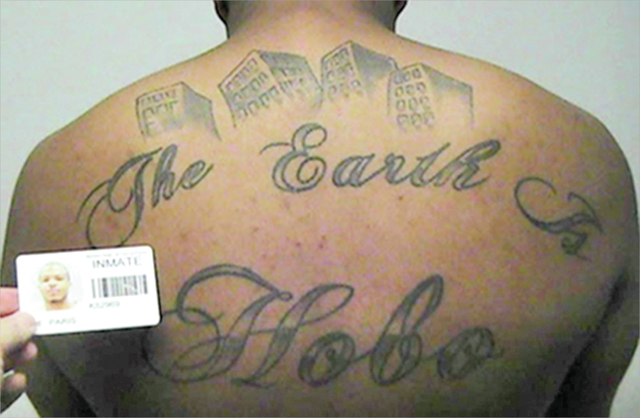Biggest street-gang trial in recent Chicago history begins

CHICAGO — Six purported leaders of Chicago’s powerful Hobos street gang went on trial Wednesday in a case that could provide a rare look inside the kind of criminal activity fueling gun violence in the nation’s third-largest city.
ADVERTISING
A prosecutor displayed photos of killing scenes and held up assault rifles during opening statements, telling jurors the defendants murdered, maimed and tortured their way into controlling lucrative drug markets on Chicago’s South Side. The trial is the biggest of its kind in recent city history and could take up to three months.
The six men charged with racketeering conspiracy were not “a group of misguided youth” but “an all-star team of the worst of the worst” who “terrorized the city,” federal prosecutor Patrick Otlewski said.
He told jurors, “You will look into the eyes of murderers … every day.”
The prosecutor began with a chilling account of how another defendant, purported Hobos hit man Paris Poe, allegedly killed government witness Keith Daniels in 2013, shooting him around 25 times at close range while his horrified stepchildren, a 4-year-old girl and 6-year-old boy, screamed inside a car.
The family had just pulled into a parking lot after returning from Sunday dinner at a grandparent’s house, the kids still playing with toys in the back seat, when Poe emerged from behind shrubbery and started firing, Otlewski said.
Badly injured, Daniels stumbled out of the car. Poe walked up, stood over him and kept shooting, Otlewski said.
As he described the slaying, the prosecutor walked toward Poe, who was sitting behind a defense table.
“Who would do such a thing?” he asked and then pointed at Poe. “That man is in this courtroom … in that blue shirt — a cold-blooded murderer.”
An attorney for alleged Hobos boss Gregory Chester told jurors the circumstances of the defendants’ lives were relevant, saying his client struggled against all odds to survive in what he called the “caldron where these men grew up without opportunities.”
“This case is about that place,” Beau Brindley said.
Chester, he added, had occasionally sold drugs to acquaintances. But he told jurors that police fabricated evidence about Chester being a Hobos leader.
“At the center of this case is police lies,” Brindley said. Molly Armour, a lawyer for defendant Arnold Council, echoed that, saying government witnesses had an incentive to lie in hopes of drastically reducing sentences for their crimes.
Poe, Chester and four other co-defendants have all pleaded not guilty. If convicted, they each face up to life in prison.
The onus is on government attorneys in a racketeering case to demonstrate a pattern of criminal behavior by the defendants within a carefully organized structure. Another defense attorney, Carl Clavelli, said the Hobos often acted haphazardly as individuals and did not meet the racketeering test.
“This is not like the mafia or the Ku Klux Klan where members come and go and the organization persists,” he told jurors.
The men’s motives for killing, the prosecutor said, fell into three categories: killing to boost their status and territory, killing over drugs and killing to eliminate those cooperating with law enforcement, like Daniels, who only days earlier had testified against the Hobos before a grand jury.
The judge ordered that jurors’ names be kept secret to ensure they are not subject to intimidation. U.S. marshals have said they are already investigating reported threats against several likely witnesses.
Among the photographs the prosecution displayed was an image of two Hobos rivals slumped over dead in their SUV after Hobos members allegedly sprayed it with gunfire in a drive-by attack as the victims left a funeral service.
At one point, Otlewski held up two black rifles in each hand a few feet from the jury box, saying they belonged to the defendants. He also held up what he called a high-powered pistol with “special bullets” that “ripped through cars and ripped through human flesh.”
“In the hands of Hobos, these were killing machines,” he said.
Later, Poe’s lawyer, Patrick Blegen, told jurors to focus on evidence in the months to come.
“Calling someone a cold-blooded murdered is not evidence. … Righteous indignation is not evidence,” Blegen said.
Prosecutors say the Hobos formed from several fractured gangs with home bases in Chicago public housing complexes that have since been demolished. Government filings cite one co-defendant, William Ford, as explaining in a secretly recorded conversation how the gang got its name from an early emphasis by its founders in 2003 on jewelry and other heists.
“After they kept robbin’ … they like, ‘Man, we Hobo,’” Ford said, according to court filings. “And Hobos, all they do is sleep and rob.”
But the Hobos’ apparent willingness to resort to violence meant those goals changed over a decade to the point where they became one of the city’s dominant gangs. Another Hobos motto, which Poe has tattooed to his back, reflected that ambition — “The Earth Is Our Turf.”
“They weren’t satisfied with a single block,” Otlewski said Wednesday. “They were building and establishing power and territory.”
The Hobos often secured the cocaine, crack, heroin and marijuana they sold by robbing other drug traffickers, Otlewski said. Gang members once forced their way into a home they believed was a trafficker’s stash house, torturing two Mexicans inside by pressing a hot clothing iron onto their skin.


